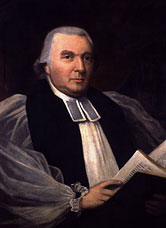“A Christian is not a [person] who never goes wrong, but a [person] who is enabled to repent and pick himself up and begin over again after each stumble—because the Christ-life is inside him, repairing him all the time, enabling him to repeat (in some degree) the kind of voluntary death that Christ Himself carried out.” These words written by CS Lewis in his wonderful book, “Mere Christianity,” remind us of the truth that Christians, like every human being, make mistakes.
But because the Spirit of God is inside us, given to us to live out that Christ life from baptism, we can always pick ourselves up, repent and begin again… We can always do that, there is always the possibility of life anew. In the midst of our struggles, it is God who helps repair us, enabling us to do Christ’s ministry in the world. In many ways, CS Lewis is talking about holiness that is part of the Christian life, the ability to pick up and start again by the grace of God.
A temptation that confronts us on this day of All Saints, is to put the saints in a box and believe they are the holy ones, not you and me, they got it all right, they are the heroes of the faith. And we can leave the virtuous or the holy life for them while we live our ordinary lives. But the saints can’t be put into a box, and yes they are in one sense heroes of the faith for the actions that we remember them for, but just like us, they screwed up, they ran away, they failed to commend the faith that was in them, they made mistakes.
Francis of Assisi sought glory in battle. Teresa of Avila, after her mother’s death, sought comfort in world’s pleasures and materials. William Wilberforce lived well with his wealth enjoying gambling, singing, and the life of an upper class politician in England. Thomas Becket was trained in law and was also an ordained deacon and as chancellor of England under Henry II helped him politically against the Church.
And all of these people changed their ways, began anew and we remember them today as saints because of their actions after they repented and started again.
“In truth all human beings are called to be saints, but that just means called to be fully human, to be perfect – that is whole, mature, fulfilled. The saints are simply those men and women who relish the event of life as a gift and who realize that the only way to honor such a gift is to give it away.” These words written by William Stringfellow in 1966 remind us that indeed we are called to be saints too, to be fully human, living our lives as a gift. And those saints we remember and those whose deeds are forgotten but whom God honors, we can find that they made mistakes, but they lived their lives as gift, being fully human and following Jesus.
But how do we approach All Saints? How do we understand ourselves becoming saints on the path God has called us to follow?
The words of the Prophet Micah come to mind… What does the Lord require of you but to do justice, and to love kindness, and to walk humbly with your God.
Elizabeth of Hungary, daughter of the King of Hungary, born in 1207, lived the life of the daughter of a king, she married a noble, raised children, lived a life of royalty but she would not forget those in need in the realm, taking from the treasury to help those in need or sickness, even helping to found hospitals when the plagues came. She acted justly.
Bishop Nicholas of Myra was known for his outreach to the sailors who entered the port of Myra and for caring for the children of the city & countryside; he often brought gifts, clothing, blankets to the children and their families (to the sailors too); he loved all those who he came into contact with and to this day his name St. Nick, is one of the most revered saints of the church, ask any child. He acted with kindness.
Aidan was a gentle monk who lived off the coast of England in Lindisfarne, would help re-establish Christianity in England in the 7th Century. He was known for his walking the countryside engaging both rich & poor, and as one historian put it “he invited them, if pagans, to embrace the mystery of the faith; or if they were believers, to strengthen them in their faith and stir them up by words and actions to alms and good works.” He walked humbly with God.
Each of these saints of the Church followed the Lord in their age, in their context, reaching out as they followed Jesus. To follow the saints, is not about carrying out great penitential acts to show our unworthiness nor is it refraining from all the enjoyment that life can bring. Rather, as one writer put it, it “can be seen in hands ready for acts of justice, hearts overflowing with tender compassion, and heads bowed in humble acknowledgment of who we are before God.” (Penelope Mark-Stuart)
And it may be as simple as recognizing the Christ who is in our midst, given to us at our Baptism, who awaits our notice, our love, prayers and guidance…
Even someone like CS Lewis, who gave us that great quote, who has given us such great literature, he left the Anglican faith he was raised with in his adolescent years but throughout his long academic and scholarly career began an inner search that led him from atheism to agnosticism to theism and finally back to faith in Jesus Christ. With that in mind let us hear that quote from him again…
“A Christian is not a [person] who never goes wrong, but a [person] who is enabled to repent and pick himself up and begin over again after each stumble—because the Christ-life is inside him, repairing him all the time, enabling him to repeat (in some degree) the kind of voluntary death that Christ Himself carried out.”
He understood intimately in his own life the words he wrote: that you can start again and that it is God who repairs us. And so it is for you and me, and for all the saints of ages past and yet to come. Pray that on this day, we might have the faith, the courage, the understanding to continually repent and pick ourselves up and follow Christ anew, and remember those blessed saints for their virtuous and godly living and for picking themselves up by God’s grace, that we too may come to those ineffable joys that God has prepared for all God’s people. Amen.
 The calendar features a Nativity scene decorated with numbered windows that are opened by the click of a mouse. Behind each window visitors will find a photograph from the crèche exhibit and links to a meditation, a carol, an audio reflection on the daily readings and a giving opportunity.
The calendar features a Nativity scene decorated with numbered windows that are opened by the click of a mouse. Behind each window visitors will find a photograph from the crèche exhibit and links to a meditation, a carol, an audio reflection on the daily readings and a giving opportunity.












